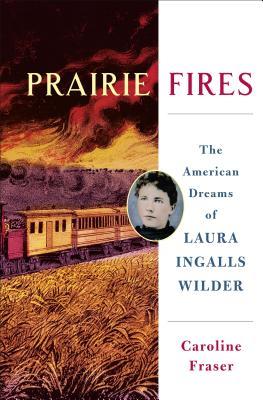What do you think?
Rate this book


640 pages, Hardcover
First published November 14, 2017
[Her father’s] most remarkable gift, as Laura saw it, was a deep and profound contentment with what he had. Despite all the losses and reversals, the perils, the hunger, the always disappointed hopes in the next harvest, he was satisfied in the life he had chosen. He cherished his wife, his children, and his music:
“All Father needed to make him happy [Laura wrote in an unpublished manuscript] was his family, a new, wild country to live in or travel over, good hunting and fishing, some traps, his gun, two good horses hitched to a rain-proof covered wagon and his violin…�
“[Laura’s] voice speaks to us of those people and their feeling for the land. It speaks not about policy or politics but about her parents, her sisters, her husband, and her love for them. It speaks of her delight in nature, those glorious moments on untouched open prairies, watching the geese fly overhead.�
Sometime shortly after his death, she wrote an essay about her earliest memories of him. It seems more than a mere tribute or homage, attesting rather to a powerful need to weave her way back into his presence, to find him again through the art of description. It starts with his eyes, "so clear and sharp and blue" that could "look so unerringly along a rifle barrel in the face of a bear � and yet were so tender as they rested on his Carolyn � or me." She recalled his thick brown hair and his strength and endurance he had in youth, tramping "all day through the woods without fatigue" and carrying his infant daughter just a surely and patiently when she was sick or could not sleep.The following is Fraser's summary of aspects of Laura's life that were left out of the Little House series:
His most remarkable gift, as Laura saw it, was a deep and profound contentment with what he had. Despite all the losses and reverses, the perils, the hunger, the always disappointed hopes in the next harvest, he was satisfied with the life he had chosen. He cherished his wife, his children, and his music:"All father needed to make him happy was his family, a new wild country to live in or travel over, good hunting and fishing, some traps, his gun, two good horses hitched to a rain proof wagon and his violin.
I am not sure but I should have put the violin first and the family second and I know that its place was second only to the family with us all.
It made merry with us when we were glad, it sympathized with us when we were sad, it gave us paeans of praise when we had been good or successful and acted as a father confessor when we had been bad." (p202-203)
In construction her autobiographical series, Wilder and her secret editor had skillfully and purposefully left out an exhausting list of revealing events, details, and characteristics: her brother Freddy's death, her father's persistent debt, his failures as farmer and provider, and the entire span covering the lurid shenanigans at Burr Oak and Walnut Grove, including Laura's servitude under the McMasterses. In her Hard Winter she disposed forever of the horrible George and Maggie, and their ill-timed baby. In Little Town, she improved her test scores. In These Happy Golden Years, she tidied up her first composition "Ambition" quoted in full. But nothing more consequential, more dramatic, and more heart breaking than what she left out at the end, the grief and penury that was soon to come.The following is Fraser's final take on Laura Ingalls Wilder's legacy to American literature.
The series would show none of it. Her final novel was her last opportunity to spend time with parents long gone, her last word on a marriage that began with such joy and promise. Secure in the eternal present tense, the last thing Laura says to the reader is, "It is a beautiful world."
Wilder could go no further. Her life story, re-imagined as an American tale of progress, was uplifted by authenticity and suffused by an ineffable sorrow. But for the rest of her life, she was done with all that. She had restored the family fortunes in fiction and fact. She had said goodbye. "We are all here" went the song the family sang in their darkest, coldest hours. In Wilder's re-creation of the past, they still are. (p440)
Her voice speaks to us of those people and their feeling for the land. It speaks � about her parents, her sisters, her husband, and her love for them. It speaks of her delight in nature. � � Wilder's family was every family that came to the frontier and crossed it, looking for something better, something beyond, no matter the cost to themselves or others. But however emblematic her portrait, it was also achingly specific, down to the lilt of the songs they sang and their last glimpse of an intact prairie: the grasses waving and blowing in the wind, the violets blooming in the buffalo wallows, the setting sun sending streamers through the sky. In the end, being there was all she ever wanted. (p515)